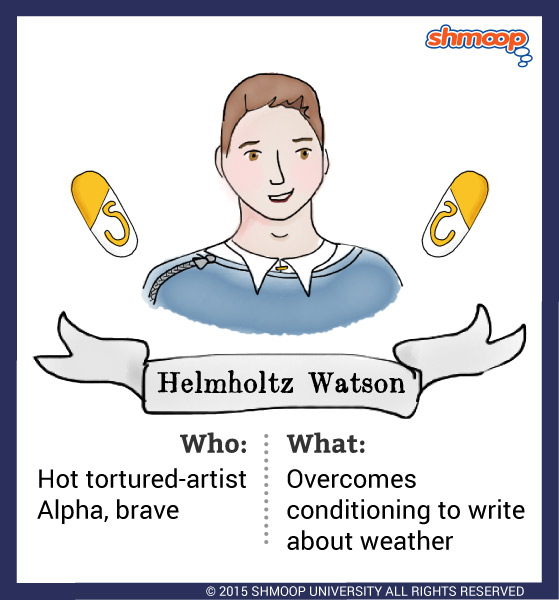Character Analysis

(Click the character infographic to download.)
Helmholtz Watson is the George Clooney of Brave New World. In other words, Helmholtz is the Alpha male. The first time we see him, he's turning down a foursome with three women. He's got the good looks, the brains, and the rebellious James Dean thing to back it up. On top of that, he's a dark-and-mysterious tortured artist.
Of course, Helmholtz is too peripheral to be our protagonist, but he makes a great accomplice. As such, Helmholtz always exists in relation to someone else, first to Bernard and then to John. We'll look at the Bernard relationship first. This is shaky ground for both men. Bernard is obviously insecure, so being around someone as confident and competent as Helmholtz puts stress on his already-strained ego. On the other side of the friendship, Helmholtz is so composed that he's embarrassed for his less-put-together friend. We talk about their differences a lot in "Character Roles," since the two men act as a foil for each other. For now, suffice it to say that Helmholtz has the courage of his convictions, and Bernard is a complete ninny.
The relationship between Helmholtz and John, however, is a whole different animal. These men are equals. They share passion, intellectual curiosity, and an intense appreciation for high art. Well… almost. There was that unpleasant incident where Helmholtz laughed at Romeo and Juliet, but we've got to cut the guy some slack. After all, he was conditioned just like everyone else in the World State.
The big question is whether or not Helmholtz can overcome his conditioning to become a truly free man. After all, he definitely has his limitations. He can't imagine writing about love, jealousy, the family, or any of the other "smutty" things one finds in Shakespeare. Yet he insists he can find something else to write about; something that isn't incompatible with his worldview but that is still passionate, emotional, intense, and violent. The World Controller claims that there is no such thing. "If it were really like Othello nobody could understand it, however new it might be. And if were new, it couldn't possibly be like Othello."
But Helmholtz remains undeterred. He actually grabs onto the one passionate, emotional, intense, violent anchor available to him, despite his conditioning and the horribly limited extent of his emotions and knowledge: the weather. But you'll have to read "Symbolism, Imagery, Allegory" for more on that.